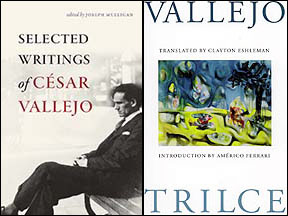Today’s Throwback Thursday poem is from César Vallejo’s Trilce, first published in Peru in 1922, the year after the poet spent 105 days in prison for allegedly instigating a partisan skirmish in his hometown, Santiago de Chuco. Trilce is still considered one of the most radical Spanish-language avant-garde poetry collections ever written. Wesleyan’s edition of the book was translated by Clayton Eshleman and published in 2000. Eshleman was awarded a National Book Award for his co-translation of The Complete Posthumous Poetry, and was a Griffin Prize finalist for The Complete Poetry of César Vallejo. A voluminous edition of Vallejo’s writing is newly available from Wesleyan: Selected Writings of César Vallejo. This new collection, edited by Joseph Mulligan, contains some poetry and a vast number of prose pieces translated to English for the first time. There are articles documenting Vallejo’s travels in Soviet Russia, personal correspondences, and excerpts from several of his plays as well as from his his novel El tungsteno / Tungsten, a work addressing the oppression of indigenous Peruvian miners.
w
From Trilce
| XVIII
Oh las cuatro paredes de la celda. Criadero de nervios, mala brecha, Amorosa llavera de innumerables llaves, Ah las paredes de la celda. Y sólo yo me voy quedando, |
XVIII
Oh the four walls of the cell. Breeding place for nerves, foul breach, Loving keeper of innumerable keys, Ah the walls of the cell. And only I hang on, |
CÉSAR VALLEJO (1892–1938) was born in the Peruvian Andes and, after publishing some of the most radical Latin American poetry of the twentieth century, moved to Europe, where he diversified his writing practice to encompass theater, fiction, and reportage. As an outspoken alternative to the European avant-garde, Vallejo stands as one of the most authentic and multifaceted creators to write in the Castilian language.







